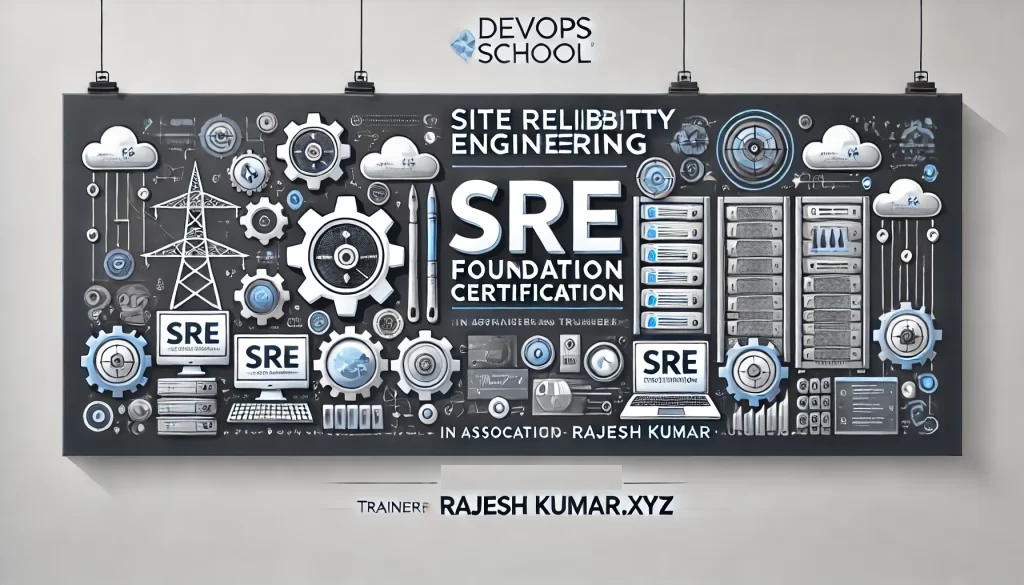
In today’s fast-paced digital world, ensuring the reliability and efficiency of software systems is more important than ever. Site Reliability Engineering (SRE) has become the go-to approach for balancing system reliability and development speed. To help professionals and students alike build a strong foundation in this field, DevOpsSchool, in association with expert trainer Rajesh Kumar from RajeshKumar.xyz, has introduced the SRE Foundation Certification. This guide provides a complete overview of the certification program, covering everything you need to know to master the principles of SRE and advance your career.
1. What is Site Reliability Engineering (SRE)?
- Definition: SRE is a software engineering discipline that focuses on improving the reliability, scalability, and efficiency of systems through automation and monitoring.
- SRE vs DevOps: Although closely related to DevOps, SRE emphasizes a stronger focus on operations and infrastructure, bringing software engineering approaches to the traditionally manual tasks involved in system administration.
2. Overview of the SRE Foundation Certification
- Certifying Body: This certification is offered by DevOpsSchool, in collaboration with renowned DevOps expert Rajesh Kumar.
- Target Audience: This certification is designed for professionals, students, and enthusiasts who want to start or expand their careers in Site Reliability Engineering.
- Prerequisites: No prior experience is required, but a basic understanding of system administration, software development, or IT operations can be helpful.
3. Why Pursue the SRE Foundation Certification?
- High Demand for SRE Professionals: With organizations heavily relying on continuous availability and performance, SRE has become a critical skill set.
- Career Advancement: The SRE Foundation Certification opens doors to higher-paying roles like Site Reliability Engineer, DevOps Engineer, and Systems Administrator.
- Skills Gained: The certification ensures you gain expertise in automating operational tasks, creating highly reliable systems, and adopting industry-leading SRE practices.
4. Certification Agenda and Key Topics
The SRE Foundation Certification provides a comprehensive agenda, designed to cover every critical aspect of Site Reliability Engineering. Below are the core topics covered in the training and certification program:
A. Introduction to SRE Principles and Practices
- Defining SRE: Understanding the history and importance of SRE, how it emerged, and its role within the software lifecycle.
- SRE vs Traditional Operations: How SRE differs from traditional system administration and IT operations.
- Google’s Approach to SRE: Exploring how Google popularized SRE and its key role in ensuring scalable systems.
B. Service Level Objectives (SLOs), Indicators (SLIs), and Agreements (SLAs)
- Defining SLOs, SLIs, and SLAs: Understanding these fundamental metrics and how they align business expectations with operational reality.
- Importance of Error Budgets: How error budgets help balance the need for innovation with the need for system reliability.
- Practical Examples of SLOs and SLAs: Real-world applications of these metrics in managing systems.
C. Monitoring, Alerting, and Incident Management
- Monitoring Best Practices: Understanding what to monitor, the difference between active and passive monitoring, and implementing effective monitoring systems.
- Alerting Systems: Creating efficient alerting mechanisms that notify teams of incidents without creating alert fatigue.
- Incident Management: Techniques for managing and responding to incidents, including postmortem best practices and preventing recurrence.
D. Automation and Toil Reduction
- Automating Manual Tasks: How automation reduces operational overhead and increases reliability.
- What is Toil?: Understanding toil in an SRE context and how to reduce it through automation.
- Case Studies on Automation: Real-world examples of successful automation implementations in SRE.
E. Managing Change in Complex Systems
- Change Management in SRE: How SRE teams handle change in highly complex systems while maintaining stability.
- Risk Mitigation Techniques: Understanding how to deploy software changes with minimal risk through techniques like canary deployments and feature flagging.
- Progressive Delivery: Using techniques such as continuous delivery and A/B testing to manage risk in software updates.
F. Building Resilient and Scalable Systems
- Redundancy and Failover Strategies: Designing systems with built-in resilience and failover capabilities to avoid single points of failure.
- Scalability Principles: How to scale systems based on growing user demands while maintaining performance and reliability.
- Disaster Recovery Plans: Preparing and implementing effective disaster recovery strategies to minimize downtime during catastrophic events.
G. SRE Culture and Team Dynamics
- Building an SRE Team: How to structure and nurture an effective SRE team within an organization.
- Fostering a Culture of Reliability: Encouraging teams to prioritize reliability across the development and operations lifecycle.
- Collaboration with Development Teams: Best practices for SREs to work hand-in-hand with software developers and operations teams.
5. Exam Preparation Tips
- Understand the Core Concepts: Focus on understanding the key SRE concepts like SLAs, error budgets, and incident management.
- Hands-on Practice: Work on real-world projects or simulate SRE scenarios using DevOps tools to reinforce your learning.
- Attend Live Sessions: Take advantage of the live training sessions offered by Rajesh Kumar through DevOpsSchool to clear any doubts and gain deeper insights.
- Leverage Community Support: Join SRE and DevOps forums, and participate in discussions to stay updated on the latest trends and best practices.
6. Certification Exam Details
- Format: The certification exam is conducted online with multiple-choice questions based on the concepts covered during the training.
- Duration: The exam typically lasts 60-90 minutes.
- Passing Criteria: A minimum score of 70% is required to pass and earn the SRE Foundation Certification.
- Recertification: Professionals are encouraged to stay updated with new SRE practices by recertifying every two years.
7. Conclusion: Why Choose the SRE Foundation Certification?
The SRE Foundation Certification by DevOpsSchool, led by Rajesh Kumar, provides an excellent opportunity to gain in-demand skills in system reliability and scalability. Whether you’re a student, a professional in IT, or someone looking to transition into the SRE field, this certification offers comprehensive training, practical skills, and a globally recognized credential. With SRE becoming more critical to the success of modern organizations, now is the perfect time to level up your career with this certification.






Leave a Reply
You must be logged in to post a comment.